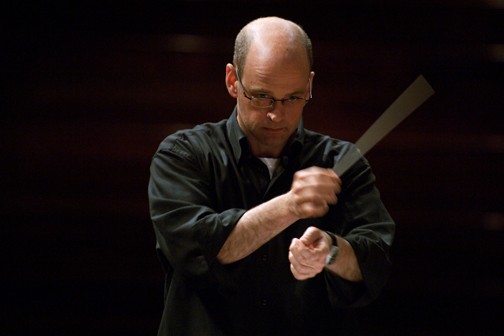BMOP opens season with a fascinating array of Canadian music

Gil Rose led the Boston Modern Orchestra Project in a program of Canadian music Sunday at Jordan Hall.
Geographically, Canada is not that far away from Boston. Some of the Canadian music heard Sunday afternoon at Jordan Hall, however, sounded like it was coming from a much greater distance.
The Boston Modern Orchestra Project began its subscription season Sunday with “True North,” featuring four composers with ties to our neighbor country. Conductor Gil Rose led his solid ensemble in works by Kati Agócs, Colin McPhee, Michael Colgrass and Claude Vivier, which may not have uncovered any cohesive national identity, but certainly offered much artistic creativity and informed musicianship.
Agócs, who also shares Hungarian roots, was in attendance for this performance of her Vessel. This brief but compelling setting of e. e. cummings’ i carry your heart (i carry it in), is set for small ensemble and three female singers, treating the voice as an instrumental color in the ensemble’s sonic landscape.
Sonja Tengblad’s high, crisp soprano was clearly first among equals, even thought declaiming the text appeared to be of secondary importance to the musical mix. Soprano Margot Rood added a kind of descant overlay, and mezzo Katherine Growdon provided intermittent vocalizations. The small ensemble — violin, bass, harp, piano and percussion — accompanied mainly with dense, quiet figures. Rose maintained a strong intensity throughout the work and under his attentive direction, the musicians delivered a remarkably moving performance.
McPhee’s Symphony No. 2 composed in 1957, shows the influence of his gamelan obsession and wears its pentatonic roots proudly. Accessible without quite being exuberant, the music never leaves an introspective mode in its three movements, with the finale, marked Molto energico, only staying that way for a few measures. But within that quiet framework, Colgrass explores a remarkable variety of moods and expression. With pianist Linda Osborn-Blaschke repeating the scale with lively variants, the performance was both subtle and probing.
Michael Colgrass’s Letter from Mozart was by far the most complex work on the program, and the most successfully executed. Set for large ensemble, Letter takes a theme from Mozart, stated crisply by Osborn-Blaschke to start the proceedings, and embarks on a journey that might be called “theme and incomplete variations.”
Colgrass layers the thematic explorations for various instrumental combinations in a musical style that manages to successfully straddle the line between serious and sardonic. The musical argument grows so dense that two conductors (Rose, assisted by Andrew Clark) are necessary. Yet what could become musical mayhem — overlaid sections, shifting harmonies — comes off as mysteriously affecting. The comic moments — at one point a polka tries to emerge, only to be interrupted — provide a countermeasure to the prevailing poignancy.
Claude Vivier’s Orion also shows a composer unleashing unruly orchestral forces, but maintaining firm musical control. A pastiche of styles flows by gradually coalescing into a unit. This is followed by individual episodes—a foray by the brasses, then the winds, sometimes duets pairing strings and percussion—that start to make musical sense through repetition. Rose gave trombonist Hans Bohn a solo bow at the conclusion, but there was also fine playing from concertmaster Charles Dimmick, percussionist Craig McNutt and the bass section, led through some unusual high figures by Scot Fitzsimmons.
Posted in Performances




Posted Nov 22, 2011 at 4:05 am by CanadaIsAMusicMec.ca » Around the Interwebs Today November 22, 2011
[…] BMOP opens season with a fascinating array of Canadian music – Boston Classical Review […]